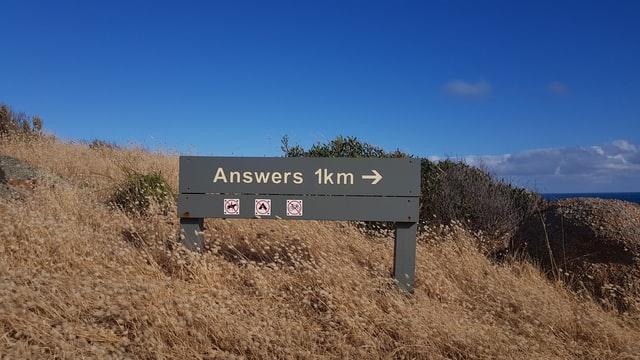
When you’re a salesperson, or anybody really, there’s one word that you love more than any other. YES! That’s why asking open-ended questions in sales conversations seems intimidating.
So most salespeople end up asking a lot of leading questions. We just want to hear that one deal-closing word.
But guess what?
Leading questions may get the response you want to hear, but only temporarily. Forcing people into decisions or tricking them into single-word answers isn’t how good deals are made.
Fortunately for us, asking open-ended sales questions closes many more deals than forcing the only response we’re hoping for. You may not think so, but it’s true!
Our Inner Child
In most circumstances, we’re all hoping to hear an affirmative response to our questions, requests, and presentations. We spend a lot of time learning about our products, and we know how they can help people.
That leads to a dangerous place where we start assuming people want what we’re selling.
The type of question matters, even for salespeople with good habits around asking questions (versus spending most of the conversation on the pitch). Open-ended questions, or qualifying questions, trump leading questions every time.
If you have kids, you probably know how young they are when they learn how to manipulate you for what they want.
After cleaning their room, they cutely sidle up to you and ask, “Aren’t you happy I put my toys up?”
There’s no other answer for that other than ‘yes.’
Then they ask, “Don’t you think I deserve a cookie for that?”
After praising them for a job well-done, it’s hard to say no. But that doesn’t mean your kiddo should get the cookie, especially if there are more good reasons for saying no than saying yes.
Open-Ended Questions in Sales
A genuinely great salesperson doesn’t enter a sales conversation by focusing on getting their prospects to say yes. Of course, that’s what they probably hope to hear at the end of the conversation. But that’s not why they pick up the phone or sit at the table.
The best salespeople want to help somebody find the most appropriate solution. They want to see if saying yes makes sense for both sides.
And they do that with questions, but not leading questions!
When you ask your prospect something like, “don’t you wish that were better?” it’s tough for them to say anything other than “yes.” Some of them might give a half-hearted shrug, but most will say, “sure, I wish it were better.” Who doesn’t want things to be better?
But that admission doesn’t mean:
- that they want to buy from you,
- they’re ready to buy right now,
- or that you’re the right person to make it better for them.
That’s why the kind of questions you ask is so important.

How to Ask Open-Ended Questions in Sales Conversations
Instead of that leading question, you can ask that same question in a way that leaves it open for a full, honest answer.
“You said that you wish you had more leads. How would more leads help you?”
Your prospect can’t just say yes or no. They have to explain why they want more leads and what they hope to gain from them. It also confirms that having more leads is what they actually want.
They might say, “more leads would give us more business and money.”
Sure, that makes sense. But the conversation doesn’t end there. No matter how the prospect answers, see if you can dig deeper.
Most people think they want more money, but you might discover that more money would lead to more overhead they’re unprepared for, and more leads wouldn’t be well-handled. It might turn out that getting more leads is not what they need, and they’d benefit more from sales coaching or raising their prices.
If you had stopped at, “sure, we wish we had more leads,” they might be miserable when the work you do for them ends up causing them more stress or even revenue loss.
The more follow-up questions you ask, the deeper you’ll get into their problems, hopes, and needs. You might hit on pain points they didn’t even realize they had. Not only does this help you close the deal (if it’s right for them), but it also allows you to build rapport and trust.
Open-Ended Sales Questions Help You Qualify Prospects
Many sales roles have a quick turnaround, and these things don’t matter quite as much. If you’re selling phones for one of the big companies, your customers know what they want and will probably be happy with what they get.
Even if you don’t work in a role like that, it might not be that important to you that the end result matches your prospects’ expectations or hopes. Maybe you just need to hit quota.
We’ve all been there, but it’s not sustainable.
Qualifying your prospects matters if you sell in B2B or relationship-driven service. And it’s just as vital for them as it is for you.
Asking open-ended questions during a sales call helps you qualify prospects to ensure they’re the right fit for your business. You can build standard questions into your sales method so that you never miss the important stuff.
Nobody wants to deal with clients who are always complaining about the service they get. Or are constantly confused about what’s happening and need frequent hand-holding or reminders.
You want clients who know what to expect and are happy with the type, level, and quality of service they get. That means you both need to be on the same page about the process, product, communication, etc. The only way to get there is to ask qualifying questions during your sales calls.
Ask Before You Sell
A genuinely effective sales conversation shouldn’t feel like a pitch for your prospect. It should feel like a friendly chat between friends. Or at its most professional, a warm discussion between business associates.
We’ve all seen the courtroom drama where the raging lawyer asks, “Didn’t that make you so angry?” And then the defense attorney shouts, “Leading the witness!”
Those types of questions are meant to manipulate, and you don’t want to be the salesperson who tricks people. You want to build trust and be seen as somebody that wants to solve a problem, not make a quick buck.
So in your next sales conversation, don’t worry about getting people to the yes. Focus on getting them to the next question.
Build open-ended questions into your sales process, and I promise they’ll lead to more genuine and eager ‘yesses’ and long-lasting professional relationships in the future.

